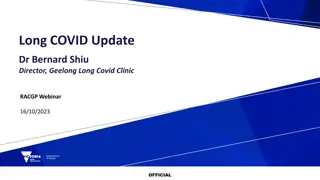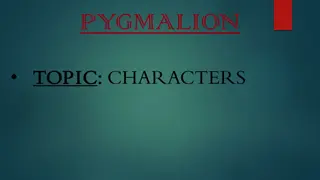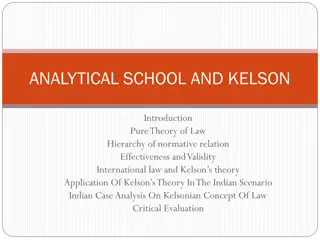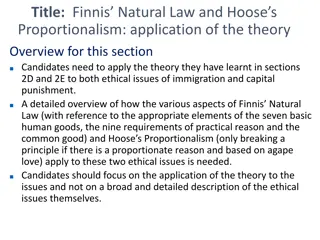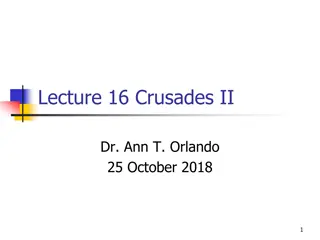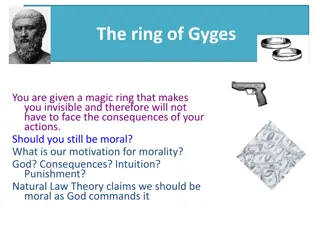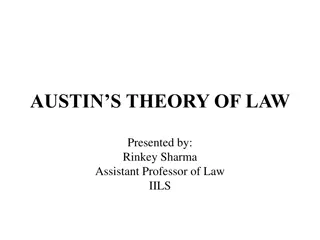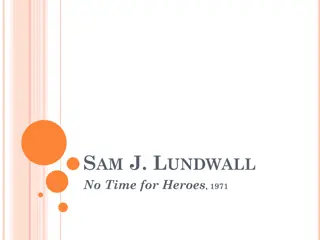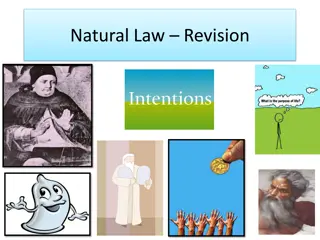Understanding Bernard Hoose's Proportionalism in Natural Law Theory
Bernard Hoose's Proportionalism presents a modern take on Natural Law theory, offering a hybrid approach that considers teleological perspectives. Proportionalism acknowledges certain acts as inherently wrong but allows for exceptions based on proportionate reasons. This flexible framework operates within the bounds of Natural Law, emphasizing the importance of achieving greater goods even if it means deviating from traditional moral rules.
Download Presentation

Please find below an Image/Link to download the presentation.
The content on the website is provided AS IS for your information and personal use only. It may not be sold, licensed, or shared on other websites without obtaining consent from the author. Download presentation by click this link. If you encounter any issues during the download, it is possible that the publisher has removed the file from their server.
E N D
Presentation Transcript
Natural Law Bernard Hoose s Proportionalism
Natural Law summary The goods are universal, self evident, valuable and obvious Application of Finnis Natural Law and Hoose s Proportionalism to immigration and capital punishment Aquinas Application of Natural Law Abortion John Finnis Reason Seven basic goods Key information Purpose - teleological Absolute Precepts Kainz Deontological Nine requirements of practical reason 4 Laws Virtues - Kainz 5 What is the common good Real and apparent goods Interior and exterior acts 4 Why do we need authority Bernard Hoose 3 Voluntary Euthanasia Deontological and teleologica Key information Key idea of proportionalism his maxim 2 Precepts 2 Evil moral act Laws Pre-moral ontic act Virtues Right act Real and apparent goods Good act Interior and exterior acts
Evaluation of Natural Law, Finnis and Proportionalism Evaluation of Natural Law, Finnis and Proportionalism Natural Law Finnis It is a successful theory Strengths Weaknesses It is not a successful theory Hoose Strengths Weaknesses
Natural Law - recap Aquinas natural law was deontological and absolutist. If something prevents the fulfilment of a thing s God given purpose, it is wrong and immoral. Example: Using contraception may prevent the God given will of the reproductive organs. However, as we have looked at there are many flaws with this theory ..
Bernard Hooses Proportionalism Hybrid of Natural Law A modern version of Natural Law, proportionalism, argues from a more teleological perspective. It is viewed as a hybrid. The challenge of natural law is so great that some Catholic theologians believe there needs to be a compromise between Natural Law and Situation Ethics. 'Proportionalism' (the title of a book by British philosopher Bernard Hoose) accepts, as Natural Law does, that certain acts are wrong or evil acts in themselves. However, it says that it might be the right thing to do, if there is a proportionate reason, to perform such acts. there are certain moral rules and it can never be right to go against these unless there is a proportionate reason which would justify it . Bernard Hoose Complete page 15 Deontological means Teleological means Hybrid means
Proportionalism Proportionalism works within the framework of natural law, however is more flexible if a greater good would be achieved by working outside of it. It allows for ontic goods qualities such as dignity, integrity and justice which themselves are not moral but are desirable qualities and should be taken into account when making a moral decision. Aquinas teaching does allow for a degree of proportionalism, i.e. if someone was dying of hunger it would be acceptable to steal rather than die. However However . . A proportionalist may argue that natural law fails to recognise the holistic nature of human beings because it makes a distinction between body and soul, rather than recognizing that humans are a psychophysical unity that combines reason and nature.
Proportionalism Proportionalism A proportionalist may argue that the best we can aim for is a theology of compromise since we live in a fall world (original sin) the best we can aim for is a moral compromise, not moral perfection. It can be seem as more compassionate than natural law in so much as it allows an individuals circumstances to be taken into account. It does not allow for a person to suffer just to uphold natural law and acknowledges some non-moral evils have to be permitted to bring about a greater good. What is most important is bringing about a proportionate amount of good and evil. It recognizes that natural laws must be able to change and that it is impossible to identify laws that are eternally valid without adaptation.
Tasks page 19 What is an ontic good? How did Aquinas theory allow some proportionalism? Why is proportionalism seen as more compassionate than Natural Law? What is the distinction between an evil moral act (an immoral act) and a pre-moral/ontic evil act (a bad act that in itself is not immoral)? What is the distinction between a right act (an act that follows the moral rule) and a good act (an act that is not a right act, but creates the lesser of two evils)?
Agape What is agape?
Task.. Create a summary diagram or mind map of Bernard Hoose s Proportionalism is. Next .. On the back of the A3 summary sheet Strengths Weaknesses What are the strengths of proportionalism ? What improvements does it make on Natural Law ? What are the weaknesses of proportionalism ?
Finnis natural law is steeped in history and can be dated back to Aristotle through Aquinas. This gives it a firm basis for moral decision making because it has stood the test of time. Whilst Finnis Natural law does have reference to religion and God within it, and so would be attractive to religious believers, everything else within it can be said to be universally desirable by human beings whether they are religious or not. E.g. play, friendship, beauty and understanding. Practical reason can be proven to have benefits to one s own physical and emotional health as well as to society. This aspect of his theory could appeal in a secular world that values empiricism. Finnis does make the claim that the need for religion is self-evident, yet this is an assumption which non-believers might object to since it is based on faith rather than evidence. Non-believers may point out that they feel no need at all to seek God. Finnis theory relies upon too many principles that cannot be proven and so a nonbeliever might mistrust them. For example, that the basic goods are basic or given or that a simple explanation is always preferable to a complex one. Philosophically these assumptions are questionable. Finnis Natural law takes us down a road which is inconsistent with what many, religious or non-religious alike, might now feel is unacceptable and inconsistent with morality. For example, Finnis objects to same gender coupling and reserves marriage only for a man and a woman
The weaknesses of Hooses Proportionalism outweigh the strengths. Evaluate this view. Add counter arguments Hoose s Proportionalism is a weak theory Hoose s Proportionalism is not a weak theory Universal/secular Practical reason Too many assumptions
AO2 Lines of argument The Roman Catholic Church has felt that Proportionalism promotes immoral behaviour on the basis that it does not condemn any act as intrinsically bad (but as pre-moral or ontic evil). There is little guidance by Proportionalists as how to weigh up the value of an act in relation to its disvalue. This could be very subjective and therefore could make it easy to perform acts that others would deem to be immoral, with no concrete way to judge who is correct. Many Catholics believe that God has given the Magisterium the role of guiding people s moral choices (not just spiritual influence). Proportionalists deny this thus replace the authority of the church with godless Utilitarianism (according to the Magisterium!). According to Proportionalism an immoral act is one which carries brings more ontic evil into the world than it takes away. It promotes only those acts that are proportionally valuable and so does not promote immoral behaviour. Proportionalism and Hoose still advocate that people should, in general, follow deontological laws like Natural Law. This theory merely gives the opportunity for moral agents to make a choice between two bad options in an extreme situation. Hoose s Proportionalism shows more compassion than a strict adherence to Natural Law would allow. This is more in line with the kind of morality that Jesus advocated where law was for the benefit of humankind rather than the other way around.
Hooses Proportionalism promotes immoral behaviour. Evaluate this view. Hoose s Proportionalism promotes immoral behaviour Hoose s Proportionalism does not promote immoral behaviour No absolutes More flexible but still uses deontological rules More like Jesus morality Not Catholic Does not give enough guidance
Hoose provides a basis for moral decision making for believers by claiming that Proportionalism can be seen in the life of Jesus: Jesus advocated following law but, allowed exceptions in the extreme situations like hunger or to save the life of the woman accused of adultery. Hoose gives autonomy to the moral agent by allowing them to weigh up the value or disvalue of an act proportionally for themselves rather than being ruled mindlessly by laws. This would be attractive to anyone in the modern world whether believer or not. Hoose s Proportionalism is respects Natural Law which would be attractive to believers who desire a traditional approach. It also takes into account a range of influencing factors such as intention, situation and outcome (as well as holding the law in high regard). This might be attractive to believers and non-believers alike because it appears to be more logical than simple obedience. Many religious believers would reject Proportionalism (e.g. Roman Catholics) on the basis that it does not allow for any act to be intrinsically right or wrong. The Bible seems to condemn some acts absolutely and Hoose seems to place human intellect above the need for obedience to God. Non-believers might reject Proportionalism on the basis that it still places to high a regard for law in its theory and such laws based on revelation from God (who does not exist) is irrelevant to them. If there were to accept any kind of deontological law, it would have to be based upon reason rather than any deity. Proportionalism seems like a weak fusion of Natural Law and Situation Ethics. The lack of commitment to a method or system that is clearly laid out (as by both Aquinas and Fletcher) is an inefficient compromise that combines the weaknesses of both theories rather than the strengths
Hoose provides a basis for moral decision making for believers and non-believers. Evaluate this view. Hoose s Proportionalism provides a basis for moral decision making for believers and non- believers Hoose s Proportionalism does not provides a basis for moral decision making for believers and non-believers Believers Jesus was a proportionalist Bible condemns some things absolutely do not kill, do not steal Gives moral agent autonomy to weigh up value/disvalue Not grounded in any one system Natural Law and Situation Ethics are both better Respects Natural Law Based on religious laws that are said to come from God s revelation
Finnis and Hoose recap 1. What 7 basic goods did Finnis identify? 2. List three points he made about these goods 3. Give 9 words to summarise the principles of practical reasonableness 4. Three challenges to Finnis 5. Three strengths of Finnis 6. How is Hoose s theory seen as a hybrid between deontological and teleological theories? 7. What is proportionalism? 8. According to Hoose how could a wrong act be morally right. 9. Three challenges to Hoose 10. Three strengths of Hoose
Answers 1. 2. What 7 basic goods did Finnis identify? List three points he made about these goods Give 9 words to summarise the principles of practical reasonableness Three challenges to Finnis Three strengths of Finnis How is Hoose s theory seen as a hybrid between deontological and teleological theories? What is proportionalism? According to Hoose how could a wrong act be morally right. Three challenges to Hoose Three strengths of Hoose 1. Life, knowledge, friendship, play, aesthetic experience, practical reasonableness, religion Universal, self evident, valuable, obvious Whole , prioritise, equally, not obsessed, effort, plan, don t harm a good, community, practical reason Human reason fallible, moral relativism, why those values, religious, not clear, doesn t help with dilemmas More measured, atheists, flexible, modern, community A combination of two theories Proportionalism a more compassionate theory, based on individual circumstances Circumstances Too much freedom, no method, consequentialist, rejects the church, condemned by Vatican Updates NL, Compassionate, Circumstances, effective, Aquinas 3. 2. 3. 4. 5. 6. 4. 5. 6. 7. 7. 8. 9. 10. 8. 9. 10.
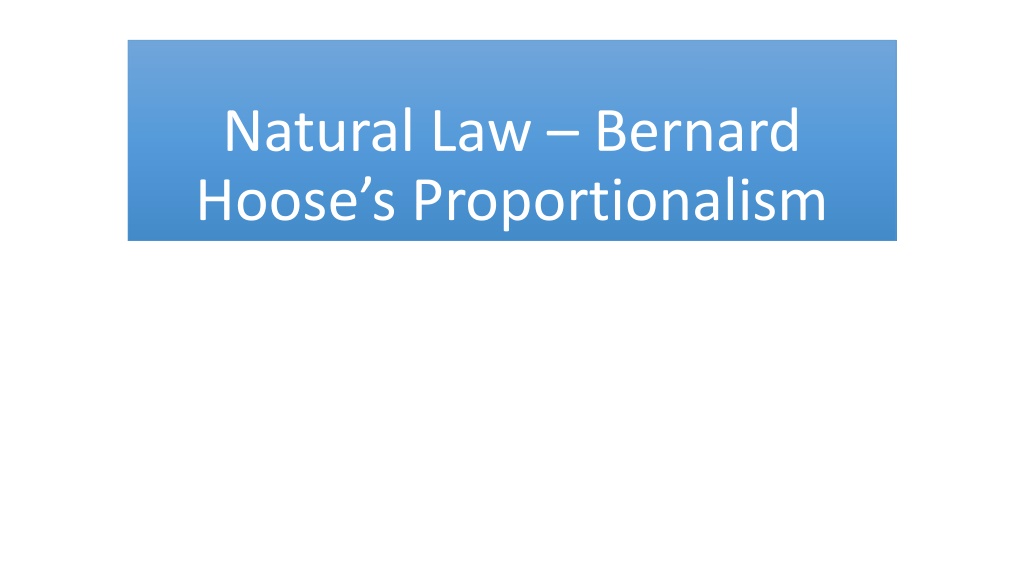

![❤[PDF]⚡ Civil War Talks: Further Reminiscences of George S. Bernard and His Fel](/thumb/20551/pdf-civil-war-talks-further-reminiscences-of-george-s-bernard-and-his-fel.jpg)
